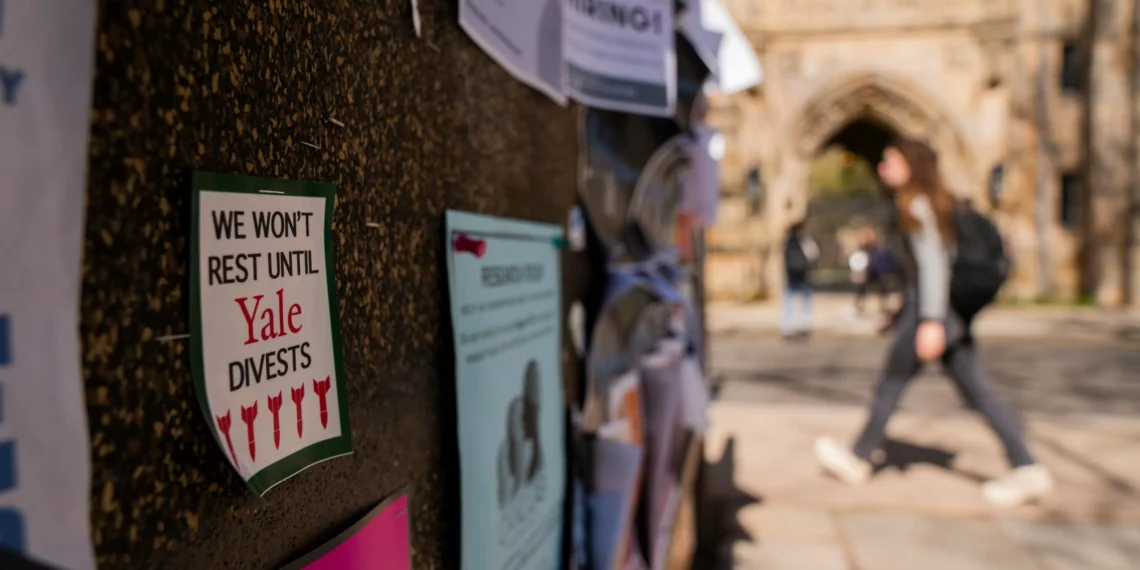A recent complaint filed with Connecticut’s attorney general has brought to light the unethical investments made by Yale University’s endowment fund. The complaint alleges that the prestigious university has been investing in companies that sell arms to Israel, a clear violation of the state’s laws and Yale’s own investment ethics policies.
The complaint, filed by a group of concerned citizens, highlights the fact that Yale’s endowment fund has been investing in companies that directly contribute to the ongoing conflict in the Middle East. These companies are known to supply arms and ammunition to the Israeli military, which has been accused of human rights violations and war crimes against the Palestinian people.
This revelation has caused a stir among the Yale community, as the university has always prided itself on its ethical and socially responsible investments. In fact, Yale’s investment ethics policy explicitly states that the university will not invest in companies that engage in activities that are “inconsistent with the values and principles of the university.”
It is clear that investing in companies that profit from the sale of weapons used in human rights violations goes against the very values and principles that Yale stands for. The complaint argues that by investing in these companies, Yale is not only violating its own policies but also the laws of the state of Connecticut.
The complaint also points out that Yale’s investments in these companies are not only unethical but also financially irresponsible. The ongoing conflict in the Middle East has led to numerous controversies and boycotts, which could potentially harm the financial returns of these investments. This raises questions about the university’s fiduciary responsibility towards its endowment fund and its donors.
Furthermore, the complaint highlights the fact that Yale’s investments in these companies go against the wishes of its own students and faculty. In 2018, a student-led referendum called for the university to divest from companies that profit from the Israeli occupation of Palestine. Despite overwhelming support from the student body, the university has failed to take any action.
The complaint has also brought to light the lack of transparency in Yale’s investment decisions. The university has not disclosed its investments in these companies, making it difficult for students, faculty, and donors to hold the university accountable for its actions.
In response to the complaint, Yale has stated that it takes its investment ethics policies seriously and will review the allegations made. However, the university has not made any commitments to divest from these companies or to increase transparency in its investment decisions.
This is not the first time Yale’s endowment fund has come under scrutiny for its investments. In 2014, the university faced backlash for investing in fossil fuel companies, leading to a student-led divestment campaign. While the university eventually committed to divesting from some of these companies, it has been criticized for not doing enough to address the climate crisis.
It is time for Yale to take a stand and live up to its values and principles. The university must divest from companies that profit from human rights violations and increase transparency in its investment decisions. As a leading academic institution, Yale has a responsibility to use its resources for the greater good and set an example for other universities to follow.
The complaint filed with Connecticut’s attorney general is a wake-up call for Yale to re-evaluate its investment practices and align them with its ethical and moral obligations. It is also a reminder to all institutions that their investments have a significant impact on the world, and they must use their power responsibly.
In conclusion, Yale’s investments in companies that sell arms to Israel are not only a violation of state law but also a betrayal of the university’s own values and principles. It is time for Yale to take action and divest from these companies, setting an example for other institutions to follow. As members of the Yale community, we must hold our university accountable and demand ethical and responsible investment practices. Only then can we truly live up to our motto of “Lux et Veritas” – light and truth.







